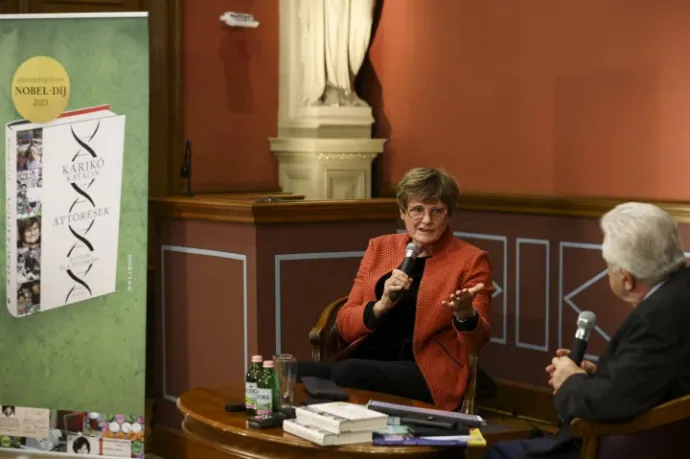Katalin Karikó: I'll give some of my prize money to the teachers
The launch of Nobel Prize-winning Hungarian researcher, Katalin Karikó’s memoir, entitled 'Breaking Through', was held at the Hungarian Academy of Sciences. At the event, she spoke about the book itself, of course, and said that she doesn't know about the situation of education in Hungary, (Karikó has lived and worked in the US since the mid-1980's – ed.) but she wants to support teachers. She also said that she doesn't want to reveal what disease she is currently researching, so as not to give false hope to those suffering from it.
Although 'Breaking Through' was written as an autobiography, it is more of a cautionary tale about the enormous opportunities the US network of academic research institutions, and indeed global science may be missing if it does not support avenues of research that at first seem unlikely, which was the case with the use of mRNA in medicine. If Karikó hadn't been so stubborn and persistent in continuing her work despite a series of setbacks, it might not have got to the stage where it is today.
To illustrate this, she shared a story about Sean Grady, the department head who actually had Karikó evicted from her office at Penn State University. She shared that the last time they had met, Grady told her that he was now giving lectures about how they had failed to notice that Karikó's research was going in the right direction. "He said: we didn't notice it and now she's saved the world," the researcher recalled.
When answering questions, she said that she had never felt homesick after leaving Hungary: whenever she was in the lab, she felt at home. "Of course I missed my family and my friends," she said.

"I'd rather not name the specific disease I'm working on now. When I had an idea in the past, no one would listen to me, so I didn't dare say it. Now I don't dare say anything, because now everyone listens to me," she laughed. The reason why she doesn't want to mention the specific direction, she said, is because she doesn't want to give people false hope: research is a long process and just because you are going in a certain direction doesn't mean that it will result in viable medication in the near future.
"I don't know where the motivation comes from for someone to become a teacher or to want to teach," she said when Telex asked if – now, that the whole world is listening to her – she would speak out about the situation of education in Hungary, the shortage of teachers, the low appreciation of teachers or the withdrawal of resources from universities. She said that all she could do was to give some of the money she receives with the Nobel Prize to the teachers. In her book, she also praises the old Hungarian education system, which helped her continue her studies.
We also asked her what she thinks about the fact that few young people are becoming teachers nowadays and that the esteem of teachers is very low in Hungary. "Obviously, this is mainly a matter of internal motivation. I don't know what the situation is like here, at home. As a researcher, I usually like to look at the data and dig into that, but this topic is not quite my area. So I'll stay with biology, stick with what I'm good at," she said.
For more quick, accurate and impartial news from and about Hungary, subscribe to the Telex English newsletter!